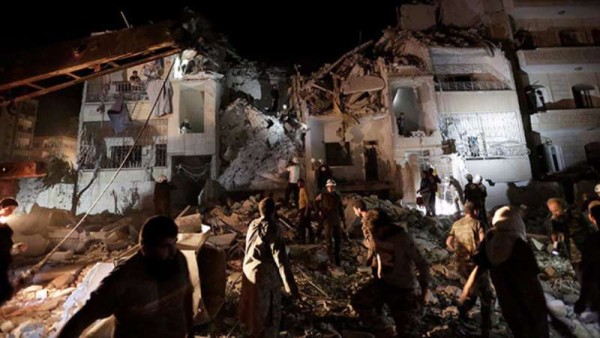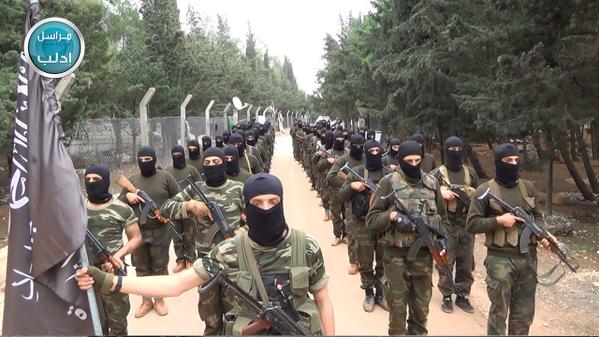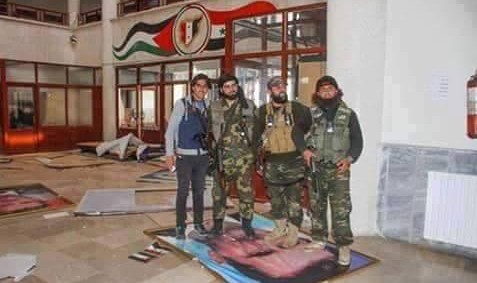PHOTO: Rebels stand on a poster of President Assad in the Idlib Governor’s Palace
Sam Heller, one of the best analysts of the Syrian conflict, writes for The Daily Beast:
As Syria’s rebels have been contained in much of the rest of the country, northwestern Idlib province has emerged as the heart of Syria’s armed rebellion against the regime of Bashar al-Assad.
But Idlib can also be a tense, scary place, according to Syrian rebels, Idlibi activists, Western officials and others interviewed by The Daily Beast in Turkey. They described an Idlib pulled between Syrian al Qaeda affiliate Jabhat al-Nusra and opposition faction and Islamist movement Ahrar al-Sham, with each trying to outmaneuver the other for control of the province.
Yet they also said that all sides in Idlib are too interdependent militarily and too tangled up at the local level to really turn on each other. Syrians who spoke to The Daily Beast described a sense of a coming showdown — but only at some vague point in the future, maybe after the fall of the regime.
“Today, if there’s a problem [between al-Nusra and Ahrar], it gets solved,” Idlib activist “Obeidah” told The Daily Beast. “But really, the issue doesn’t go away. It’s registered against each side. And so these problems accumulate.”
Obeidah met with The Daily Beast in Turkey; like other Idlib activists interviewed for this article, he asked to use a pseudonym for his safety.
“Everything that’s happening today is suppressed and checked,” he said. “But one day, it’s inevitable they’ll clash.”
“Greater Idlib”
The Idlib-centered northwest is now the dynamic heart of Syria’s armed opposition. Rebels south of Idlib have been mostly neutralized, either locked into besieged enclaves or forced to stand down by state backers. To the east of Idlib, Aleppo province was long a bastion of the mainstream opposition—the rebel-held eastern half of Aleppo city was a hub for revolutionary civil society, and non-jihadist, “Free Syrian Army” rebels dominated the city and countryside. But the regime has relentlessly attacked rebel positions in Aleppo, and a Russian-backed regime offensive in February cut rebel Aleppo to pieces. Now Free Syrian Army units only really dominate an isolated triangle of territory along the Turkish border and areas in and around rebel-held Aleppo city, whose single, precarious supply route is in constant danger of being cut by a new regime offensive.
Most of what is left of the rebel north could be called “greater Idlib”. Idlib itself is almost entirely rebel-held, and so fighters man front lines against the regime where rebel territory spills into neighboring provinces: the western and southern Aleppo countryside, the northern Hama countryside, and remaining rebel-held areas in coastal Latakia.
Any major new moves by rebels are likely to come from Idlib. While other rebels’ backers have pressured them to respect the US- and Russian-sponsored nationwide “cessation of hostilities,” Ahrar al-Sham and Jabhat al-Nusra are excluded from the main conduits of international support and thus less susceptible to foreign pressure. Ahrar has its own revenue streams — including effective control of Idlib’s Bab al-Hawa border crossing with Turkey, now the sole major inlet for trade into the rebel northwest — and alternate backers in Qatar and Turkey. Meanwhile, interviewees said al-Nusra has no state backers who can pull its strings, although that also means it has had to create its own resources.
“Ahrar al-Sham has a lot of Arab support,” said Obeidah. “Jabhat al-Nusra doesn’t have backing, so it resorts to any means it can to get support, including kidnapping journalists.”
Al-Nusra and Ahrar are the two major forces in the “Jeish al-Fatah” (Army of Conquest) coalition that ran the regime out of Idlib in 2015. Now, along with the rest of Jeish al-Fatah, the two factions are waging battle against the Syrian regime and its allies in the southern Aleppo countryside and retaking the towns Russia helped the regime seize earlier this year.

Scene of airstrikes near Idlib’s National Hospital, May 30, 2016
An Uneasy Co-Existence
Yet even as Jabhat al-Nusra and Ahrar al-Sham fight side by side one province over, they have been at odds inside Idlib. The province, interviewees told The Daily Beast, is roughly divided into al-Nusra areas, Ahrar areas, and areas where they share control — sometimes uneasily.
In the provincial capital, Idlib city, Ahrar and al-Nusra share control of a set of joint Jeish al-Fatah governance bodies that have been only imperfectly functional, handicapped by tensions between officials linked to one faction or another. In the countryside, Ahrar and al-Nusra each back separate sets of institutions, ranging from Islamic courts to service bodies. In areas of its control, al-Nusra’s courts and morals police have enforced conservative social codes and carried out the “hudoud,” Islamic capital punishments.
“Ahrar are Islamists, true, but they don’t interfere in your business,” said Idlib activist “Omar,” who spoke to The Daily Beast in Gaziantep, Turkey. “In Ahrar areas, for example, you can smoke, no problem. In Armanaz, which is controlled by Ahrar, there are lots of stores that sell cigarettes and shisha. But in Jabhat al-Nusra areas, it would be impossible to sell shisha — they’d break it over your head.”
Part of the split, Syrians say, is because Ahrar al-Sham’s commanders are Syrian and tend to be locals. While many are religiously conservative, they have ties with other local rebels and activists from early in the revolution. Jabhat al-Nusra’s rank-and-file is mostly Syrian, but many of its commanders are “ghuraba” (strangers) — either foreign fighters or Syrians from elsewhere in the country.
“With Ahrar al-Sham, in every area, it’s that area’s sons who fight there,” Idlib activist Obeidah told The Daily Beast. In his area, he said, “we started the revolution together. So they know who I am, and what I do. They trust me, and I trust them, so they protect me.”
Ahrar al-Sham is seen by many as protecting not just local civil society, but also the various Free Syrian Army factions in and around Idlib.
Jabhat al-Nusra and its jihadist allies have attacked and destroyed more than a dozen Free Syrian Army factions in the past two years, including some with a reputation for criminality and predation, but others that just fell afoul of al-Nusra.
Speaking in the offices of the Toran Center in the Turkey border town of Reyhanli, center director Muhammad Mustafa told The Daily Beast that most Free Syrian Army brigades are essentially local, something he blamed on foreign backing that had kept them small and divided. As a result, they have been incapable of any collective defense when al-Nusra has picked off individual factions.
“We’re talking about something with a regional character,” said Mustafa of the Free Syrian Army. “According to this regionalist logic, there’s no coordination. Someone looks at the whole revolution—or what he considers the revolution — through the lens of his area. If his area is fine, he’s fine. If his faction is fine, he’s fine.”
Ahrar is in an awkward position, not actually considered part of the “Free Syrian Army” but seen as the only thing stopping al-Nusra from wiping out more of Syria’s other rebels. There are obviously limits to how far Ahrar will go — al-Nusra smashed the 13th Division in the Idlib town of Ma’arat al-Nu’man in March — but activists said it was Ahrar that pushed al-Nusra to free its 13th Division captives and deterred it from attacking other factions.
“Ahrar al-Sham is the safety valve in our areas,” said Omar. “If Ahrar were gone, it would all be al Qaeda. Because if Ahrar went, all the moderate factions, the Free Syrian Army would be gone.”

Jabhat al-Nusra training camp in Idlib Province
Support for Jabhat al-Nusra
But even though Jabhat al-Nusra may be controversial, interviewees told The Daily Beast it would be a mistake to think it had no local support, particularly as it scores victories against the regime south of Aleppo.
The Assad regime and its terrifying violence against residents of opposition areas is still most opposition Syrians’ main concern. Even through the cessation of hostilities, the regime and its allies have periodically launched air strikes on civilian centers in the heart of Idlib that have killed and injured dozens at a time. Al-Nusra has fought the regime ferociously, and its sacrifices have earned the appreciation of many opposition Syrians.
“Jabhat al-Nusra has popularity in Syria,” Dr. Rami al-Dallati, a rebel political representative who has been involved in the armed opposition since early in the revolution, told The Daily Beast in an Istanbul café. “Where does it get its fighters from, Europe? No, from the people.”
And given how much effort al-Nusra had put into earning credibility and building a base of popular support, interviewees who spoke to The Daily Beast all discounted recent reports that al-Nusra might unilaterally announce a jihadist “emirate” in Idlib. Al-Nusra was smart enough not to make such a provocative move, they said, one they thought would turn Ahrar al-Sham and the broader Syrian opposition against al-Nusra.
In any case, al-Nusra has spent the last two years laying the institutional groundwork for jihadist governance, with or without an official “emirate.”
“In practice, the emirate is there—the imposition of taxes and the rest,” said an Idlibi rebel who spoke to The Daily Beast in Istanbul and who requested anonymity to speak frankly about other factions. “So they don’t need to announce the name.”
Jabhat al-Nusra did not respond to requests for comment.
Speaking to The Daily Beast, Abu Mahmoud al-Filistini — an Islamist commentator and pupil of theorist Abu Qatada al-Filistini, pillar of jihadist thought and al-Qaeda’s prime scholarly reference — said al-Nusra’s leadership and the scholars to whom they looked for guidance had agreed that declaring an emirate at this point would be a distraction from their defense of Syria’s Muslims.
“The priority is repelling the aggressor enemy” — that is, the Syrian regime — “and nothing can compete with that except for the belief in God,” Abu Mahmoud told The Daily Beast over social media.
Battlefield Cooperation
In the fight against the regime, rebels said that battlefield cooperation between al-Nusrah, Ahrar, and other rebels is both a reality and a necessity. Rebels are now squaring off against not just the Syrian regime, but also Russia, Iran and an assortment of foreign militias. Militarily, these rebels and jihadists are too mutually dependent to divide into warring ideological camps, or even to properly renounce cooperation with each other.
And the big-picture cleavages in the north — Ahrar versus al-Nusra, Free Syrian Army versus jihadists—also map awkwardly onto more local and personal ties. The result is an Idlib in which these larger, province-wide splits coexist or interact with dynamics that are wholly local.
“The strongest relationships you have on the ground aren’t intellectual or organizational in nature; they have to do with family and regional ties,” said an Ahrar al-Sham official who spoke to The Daily Beast over a messaging app. “You have families with members in Jabhat al-Nusra, Ahrar, and the Free Syrian Army.”
Interviewees told The Daily Beast that macro splits between “al-Nusra” and “Ahrar” did not necessarily mean that the young Syrian men actually flying these factions’ flags — many of whom are not hugely different from each other, or from other rebels — are at each others’ throats.
“At the leadership level [there are tensions between al-Nusra and Ahrar],” said the Ahrar official, “but not at the base level—especially among Syrians—because the base doesn’t see the big picture. They just view each other as very similar, in terms of their approach and orientation, in addition to whatever social ties that might exist.
“They’re sharing the same fronts and the same religion, and you can’t really tell the difference in terms of behavior,” he said. “You hear acute differences when you talk to religious officials and theorists, but those aren’t always communicated to the lower levels.”
When clashes do break out, they can sometimes be ascribed a big political meaning — but, just as often, they seem be the result of extremely local issues, or the swirl of civil war.
In Idlib, like the rest of Syria, armed factions of all types are trying to grab whatever they can. And the province is full of heavily armed teenagers and twentysomethings with very little to hold them back.
In April, a Jabhat al-Nusra commander was killed on the road in the Idlib town of Harem, allegedly by Ahrar fighters. Al-Nusra’s central media office issued an outraged statement, accusing Ahrar of absorbing fighters from corrupt factions al-Nusra had liquidated. Ahrar’s former top religious official published a rebuttal, saying that al-Nusra, too, had recruited some ne’er-do-wells and that al-Nusra’s mobilization of its fighters after the killing was irresponsible.
Yet al-Nusra and Ahrar’s leadership may have politicized an episode that was, at base, local and arbitrary, an Idlib activist who uses the name “Sirajeddin Ahmed” told The Daily Beast in Istanbul.
In a town like Harem, he said, “Ahrar” and “al-Nusra” are mostly just different sets of Harem residents, all of whom want to be the boss of their hometown.
“We can’t generalize and say that something that happened in Harem, or two or three people getting killed, that that’s a dispute between two ideological approaches,” said Sirajeddin.
“No, it’s an argument between individuals, a dispute over who’s powerful in that area,” he said. “But because of the dispute, one guy goes to his faction and the other guy goes to his, and people die, maybe because one idiot opened fire. And as soon as people die, it becomes a bigger story.”

